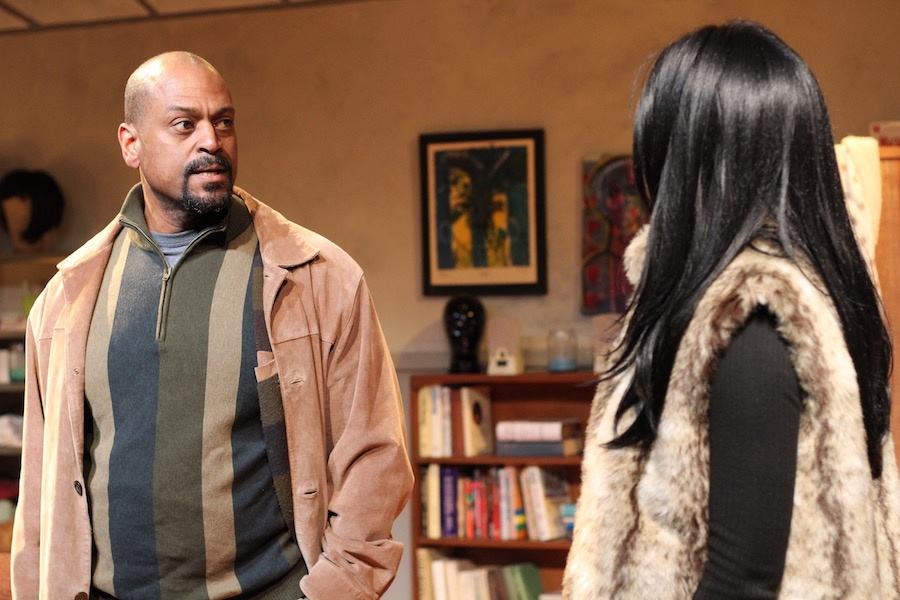
Terrence Riggins as Kenyatta Shakur and Tamika Pettway as Nina in Sunset Baby. The show runs Feb. 22, 23 and 25, March 1-3 and 8-11 at Collective Consciousness Theatre. Lucy Gellman Photos.
Kenyatta Shakur is seated in a gray-green t-shirt, shoulders just a little slouched, face trained on a chrome and silver video camera. His eyes are wide and exhausted; they’ve been to hell and back, and are ready to report on what they’ve seen. As he prepares to speak, we feel ourselves leaning in to hang on to every word.
“Fatherhood. Complex. Complicated,” he says. There’s a downbeat that lasts less than two seconds. His throat is full of gravel. “An abstract concept. Not clearly definable.”
It’s this weighted, economic use of language—the first of many—that marks Dominique Morisseau’s Sunset Baby, on at Collective Consciousness Theatre (CCT) this Thursday, Friday and Sunday, and March 1-3 and 8-11. Written by Morisseau in 2012 and directed by CCT’s Associate Director Jenny Nelson, the play explores what happens to revolutionaries after the revolution has ended.
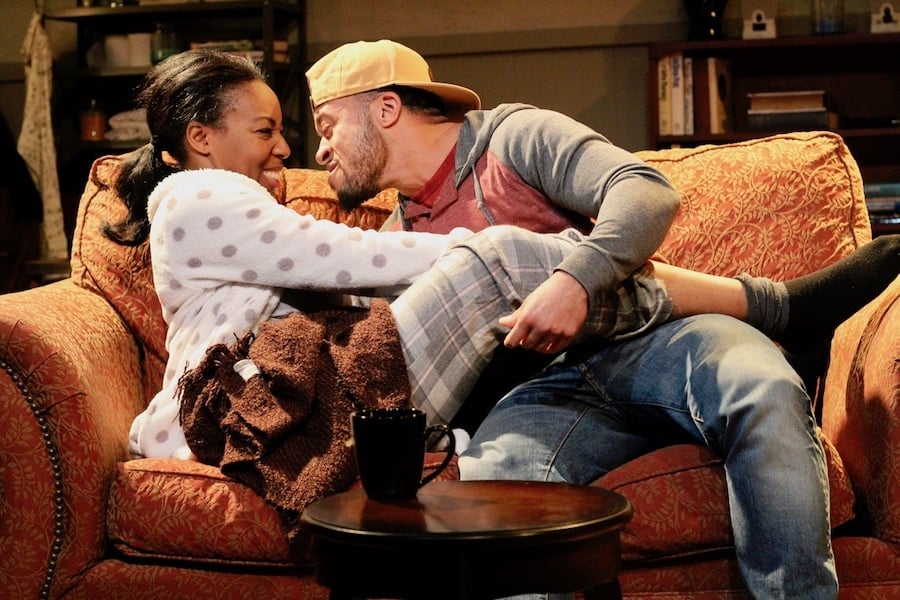
Tamika Pettway as Nina and Kingston Farady as Damon.
“This play is about love and forgiveness,” Nelson said in the theater earlier this week, joking with the actors (“my cubs!") before hours of rehearsal and talkback. “And this play really explores the powers of love and forgiveness. And I think that’s why we picked it—because it ends hopeful, and we need some hope right now.”
Hope, and also a history not taught in most history books. Set in a shabby Brooklyn apartment, Sunset Baby is familiar and unfamiliar all at once, a song we know by heart, but need to hear again before understanding it wholly. Three bodies circle in and out of this place: ex-revolutionary Kenyatta Shakur, his estranged daughter Nina, with whom he is desperate to connect, and her partner Damon, a drug dealer and robber who is also a scholar and a father struggling to reach his own young son before history repeats itself.
What brings them back into each other’s orbit is letters. Tens of them, preserved in their envelopes, that Nina’s mother Ashanti wrote to Nina’s father while he was in prison. Dead after a descent into addiction, Ashanti has left them to Nina, a birthright stamped at the upper right and marked in pen and ink. Scholars and academics want those letters but so does Kenyatta, in a pursuit of lost time.
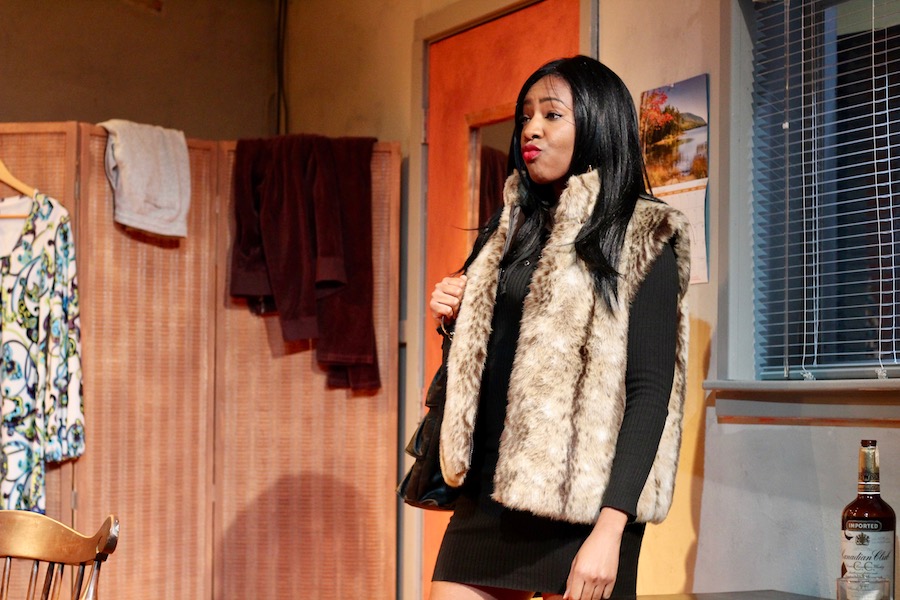
"I just love the fearlessness of Nina, because she truly says what she wants to say," said Pettway. "As harsh as it is, even though it doesn’t come out in some articulate, sophisticated way, it’s her truth. And she’s not afraid to just put that out there.”
If that’s conflict enough, so is the matter of Ashanti’s death—ravages of addiction that Nina shouldered alone, while her father was in prison and then while he was absent. Now, the girl that Kenyatta named for “our rebel music”—Nina Simone, whose voice drifts over the stage as Nina prepares to “deal drugs and rob niggas”—is not a revolution, but a study in survival.
There’s so much to unpack, and the cast does with equal parts grace and agility. In his first performance on CCT’s stage, Oakland transplant Kingston Farady slips into the role of Damon, showing a man that is caught in a web of circumstance: a drug dealer who wants to give up the game but doesn’t have the resources, a father who is trying to do better, but finds the courts against him, a partner who loves Nina, but will negotiate behind her back, drink her liquor, steal her cash, use her home as his bargaining ground.
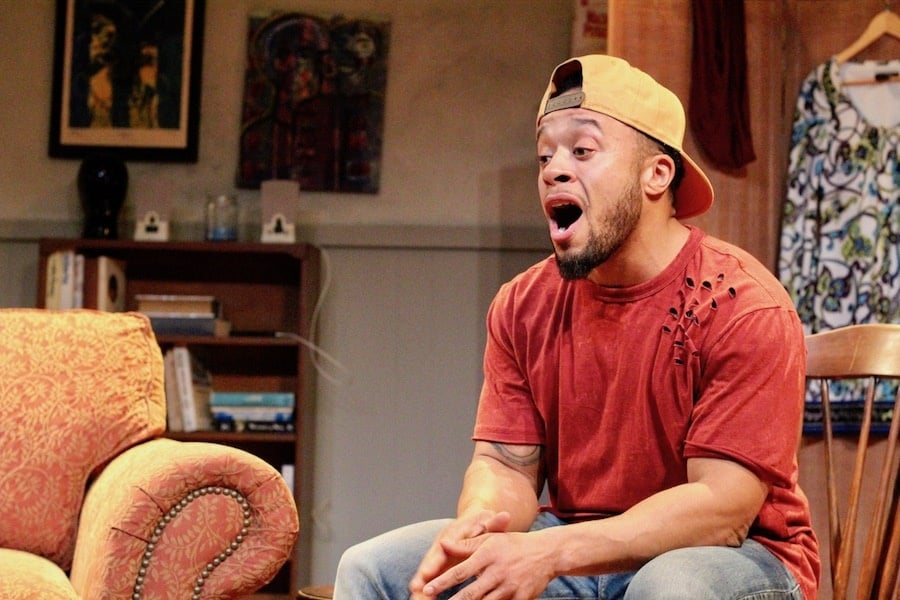
"I think that feeling of entrapment, that feeling of frustration, that feeling of being misunderstood resonates on a personal level," said actor Kingston Farady of playing Damon. "And for folks, that's something that can really resonate across the board."
His navigation of Morisseau’s text is a beautiful thing to behold, an understanding of punchy, contemporary playwriting that meets his training in Shakespeare, and comfort with verse and rhythm. Here are the same concepts of love, lusting relationships, irreconcilable conflict and layers of resentment—transported from the Bard to New York’s grungy 21st century underbelly. As he wraps himself around the language—and around Nina—we see two Damons: one who is still caught up in the life, and one who wants so desperately to leave it, because he no longer feels that he fits.
“You lookin’ at me like that for?” he asks Kenyatta as they are discussing the letters, and we wonder if he is talking to the audience too. Damon has just referred to Nina as the “sweetest bitch you wanna know” to her father, and we feel something hard and cold growing inside him, like the side of the gun he tucks behind his belt loops.
“Whatsthematter? You don’t like them words? Don’t worry. Nina don’t mind it. She knows she can be a bitch.” There’s swagger in his hips and in his shoulders. More words. His mouth is a big O, and then a smaller one. “She walk straight and hard. Musta go that from you, right?”
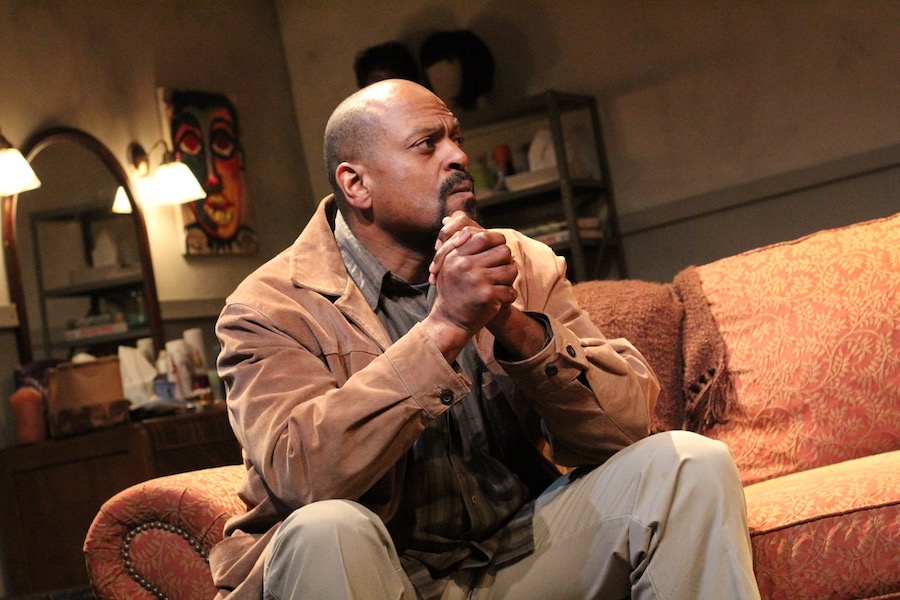
Of the role, Riggins said he's “more emotionally available” than Kenyatta, constantly reminding himself to dial his performance back, so “it’s not too much of Terrence.”
An unflinching Kenyatta (Terrence Riggins) looks back at him, letting the words sail past his face. He pretends he has not heard them, digging deeper to find details of Damon and Nina’s relationship. He’s got to be pragmatic, to find lost time, to ask the dad questions and still come away with the letters. As if the knowledge should belong to him, just as the letters to Nina.
Actors have reached into their own histories for this performance, bringing to it narratives that are both deeply personal and radically different from the characters they play. At a rehearsal earlier this week, Riggins said that it’s been hard not to bring too much of himself into the script.
It's not just the research he does for each role, he said—as he did for Dr. Martin Luther King in The Mountaintop and Lincoln in Topdog/Underdog earlier this season. He’s also already part Kenyatta, he said—he grew up among Black nationalists in 1960s Los Angeles, “a young revolutionary” himself, and is working through his own relationship with an estranged daughter in New York City.
But he’s “more emotionally available” than Kenyatta, constantly reminding himself to dial his performance back, so “it’s not too much of Terrence.” In making himself open to the role, he said, he’s been able to wrap his mind around this ex-revolutionary, but also worked to temper his own response to stay true to character. Where he is raw emotion, Kenyatta is pragmatic and methodical, not losing it even when you think he might.
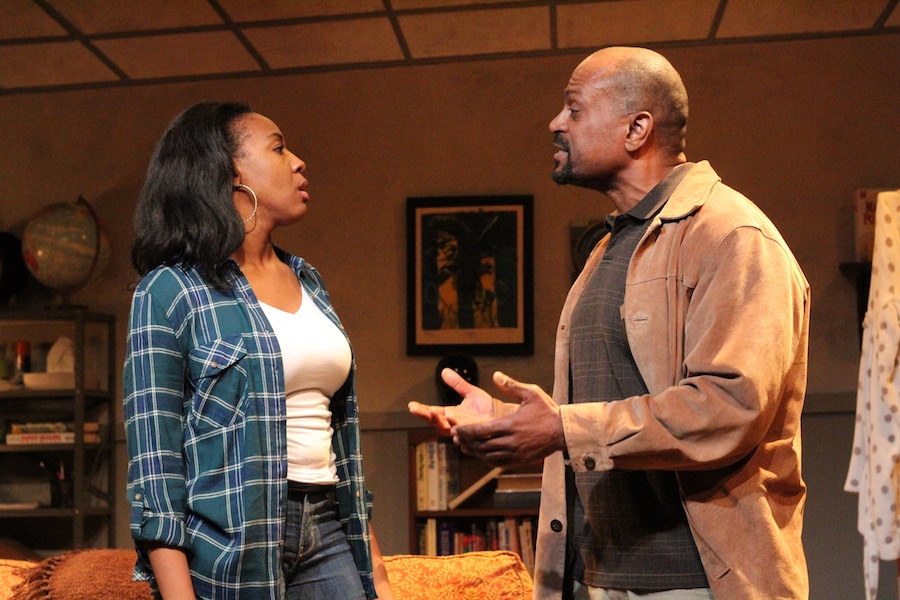
Kenyatta tells Nina he named her to be his revolution. Is she his greatest disappointment instead, she asks in response?
“This play, for me, was one of the tougher ones because it touches on my father experience,” he said, noting that he brings some degree of research to all historical roles he takes on. “Some of the feelings this character is experiencing, I can relate to … in terms of the estrangement. The distance, the time, the lapse in connection.”
It's a reality that makes history more complicated and less linear than it looks, he said—just as it's meant to in the script. He recalled sending his daughter a letter when he was living in a halfway house, not knowing whether or not to expect a response, not willing himself to think about one. When he received a letter back with unsteady, eight-year-old script on pencil, it was as if he had broken through something. That moment stays with him on stage, as his face in the video camera jumps to a projection on the back wall.
“There’s a fine line,” he said. For a moment, it was unclear if Terrance or Kenyatta was speaking. “I have to temper Terrence’s emotional life and responses, because it’s so personal that I have to ensure that I don’t impose my emotions … on the play. It’s stated that Kenyatta is holding something back. It’s challenging in that way. But it’s a beautiful thing. It’s a beautiful thing.”
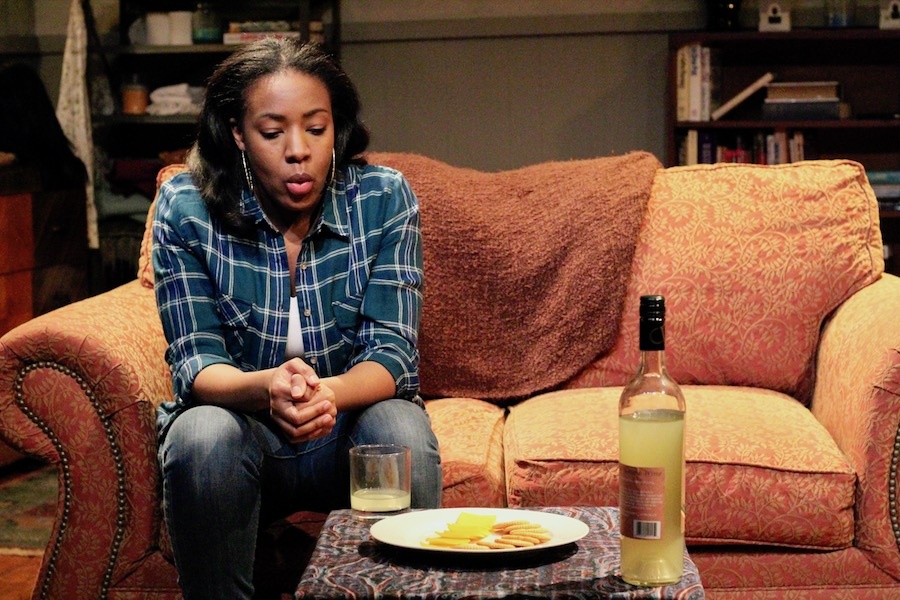
Pettway: "It offers some hope."
So too for actress Tamika Pettway (CCT’s Milk Like Sugar, Stories for a New America), whose light as Nina cannot, and will not, be snuffed out. Divisive and strong-willed, she is the glue that holds this play together, even as relationships within it rip apart. Nina does not just have big dreams—travel to London, or maybe it’s Paris, or Rio—but she knows how to get to them, even if her journey takes a long and winding route.
But she is also vulnerable, in a way that she hides from everyone around her, and only the audience gets to see. Like Riggins, Pettway said that she turned to her upbringing in New Haven for some of Nina—but also reminded herself to suspend judgement on the parts of Nina’s lifestyle that were so different from her own.
“I grew up in the inner city of New Haven,” she said. “I’ve seen plenty of people who dealt with parents addicted to drugs. I know exactly what she’s talking about. I definitely relate to her. But it’s not just me. It’s those close to me.”
But, she added, “I like to be in the moment … I leave Tamika and I become Nina. I just love the fearlessness of Nina, because she truly says what she wants to say. As harsh as it is, even though it doesn’t come out in some articulate, sophisticated way, it’s her truth. And she’s not afraid to just put that out there.”
“I think it’s a play that anyone could relate to,” she said. “If you’re able to read beneath the surface of the show, read beneath the scenes … it offers some hope. It offers hope to damaged relationships.”
Sunset Baby runs at Collective Consciousness Theatre in Erector Square from Feb. 22, 23 and 25, March 1-3 and 8-11. The theater is located More information and tickets at the organization’s website.